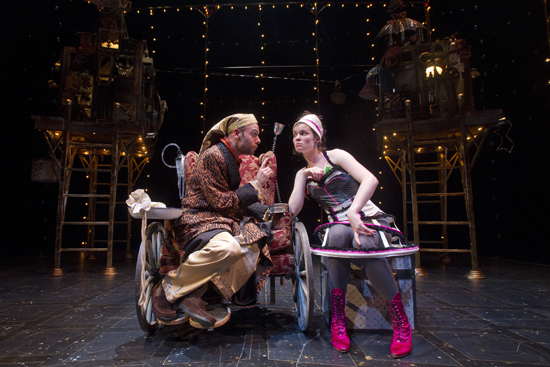CFA Presents Molière’s The Imaginary Invalid
Zany medical parable tackles death, and life

Paul D’Agostino (CFA’14) (left) plays the hypochondriac Argan and Kaley Ronayne (CFA’12) portrays his trusted servant Toinette in the CFA School of Theatre production of The Imaginary Invalid, opening tonight at the Calderwood Pavilion. Photos by Vernon Doucette
Emily Ranii prefers to direct plays that terrify her. Near the top of that list is Molière’s The Imaginary Invalid, a 16th-century satire about hypochondriacs, quack doctors, and thwarted lovers.
“If it’s not something that scares you, the challenge isn’t worth it,” says graduate student Ranii (CFA’13), who is directing a production featuring students and designers from the College of Fine Arts School of Theatre. “The play is about the ultimate fear—death—and all of the foolish things we do to avoid it. All this darkness exists within the world of a farce. Grappling with a play that is about this universal fear is scary enough. Then add the challenge of doing the comedy justice.”
Molière, playwright, director, actor, and official entertainer to France’s King Louis XIV, wrote a dozen plays that were as pertinent as they were entertaining, and his work legitimized comedy as a serious art form.
The Imaginary Invalid, which opens tonight at the Calderwood Pavilion, is one of his most cutting pieces, with its jibes at the medical profession, many of which still resonate today, and his scathing portrayal of Argan, an old man who in the end is scared senseless by the specter of death. Ironically, Molière, who played the old man in the premiere run in 1673, collapsed on stage during the fourth performance and died later that night of what was probably tuberculosis.
In The Imaginary Invalid, Molière sugarcoats the sarcasm and dark themes with slapstick, songs in gibberish, ridiculous plot twists, and comically overblown characters. This funhouse revolves around Argan, played by graduate student Paul D’Agostino (CFA’14). Argan is a bedridden hypochondriac and a miser, albeit a wealthy one. To reduce his mounting medical bills, he decides to marry off his older daughter, Angelique, to a doctor, assuring Argan all the free enemas, bloodletting, and potions he wants. Angelique has other ideas, as does Argan’s second wife, Beline. And as with most of Molière’s plays, it is a servant—here the wise and sexy Toinette—who sets everybody straight in the end.

“Of Molière’s plays, it is the most theatrical and imaginative,” says Ranii. “I’m running with that. We are working in a world in which anything is possible.”
To that end, she has exaggerated the play’s theatricality with a fairy tale–like set and offbeat costumes, accompanied by broad clowning gestures. Not surprisingly, her version is far from a historic staging, but, she feels, remains very true to the play’s spirit.
The set, designed by Andrea Nice (CFA’14), is framed by two tree houses, one for each of Argan’s daughters, that teeter over the stage. When not in the play’s action, the characters retreat to their whimsical perches, which are constructed of odd bits and pieces, such as picture frames and lampshades. The costumes, designed by Emily Astorian (CFA’13), range from Toinette’s vavoom catsuit and hoop skirt to Angelique’s demure 1950s crinolines. Argan’s costume is perhaps the most historical, with his ever-present nightcap trailing to the floor.
At Ranii’s direction, the nine actors use the overblown movements of clowning to make the characters bigger than life and heighten the play’s raucousness. Although these characters have real-world concerns, they are clearly not of this world, and Ranii drives that home. The play concludes with a chorus of English, mixed with Latin.
In the end, all this silly exuberance not only provides needed comic relief to the play’s dark central theme, Ranii says, but also offers a persuasive counterargument. “In a twisted way this play is a celebration of life through death,” she says.

The CFA School of Theatre’s production of Molière’s The Imaginary Invalid, based on a translation by Charles Herron Wall, runs from December 9 through 16 at the Calderwood Pavilion at the Boston Center for the Arts, 527 Tremont St., Boston. Tickets are $12 for the general public, and $10 for BU alumni, WGBH members, Huntington Theatre Company subscribers, students, seniors, and groups of 10 or more. Members of the BU community with a valid ID can receive one free ticket at the door, on the day of performance, subject to availability. Tickets may be purchased online, by phone at 617-266-0800, or in person at the BU Theatre box office, 264 Huntington Ave., Boston, or at the Calderwood Pavilion box office.
A discussion with the director and cast immediately follows the performance on Sunday, December 11, at 2 p.m.
Comments & Discussion
Boston University moderates comments to facilitate an informed, substantive, civil conversation. Abusive, profane, self-promotional, misleading, incoherent or off-topic comments will be rejected. Moderators are staffed during regular business hours (EST) and can only accept comments written in English. Statistics or facts must include a citation or a link to the citation.